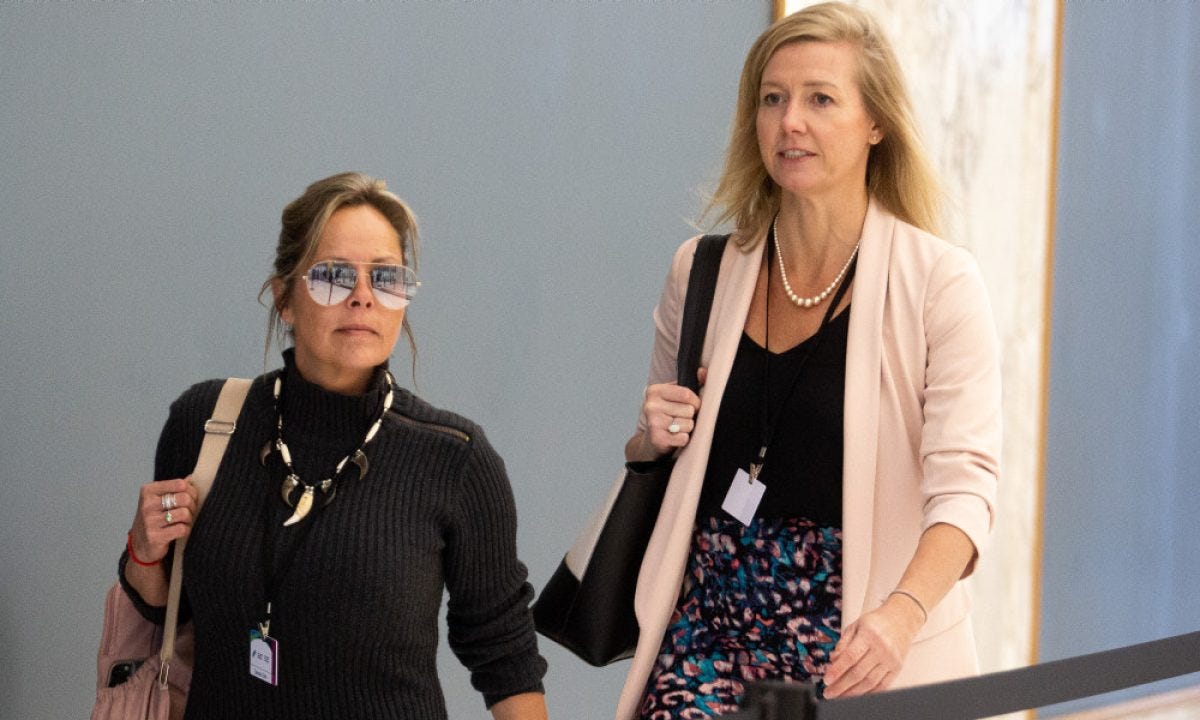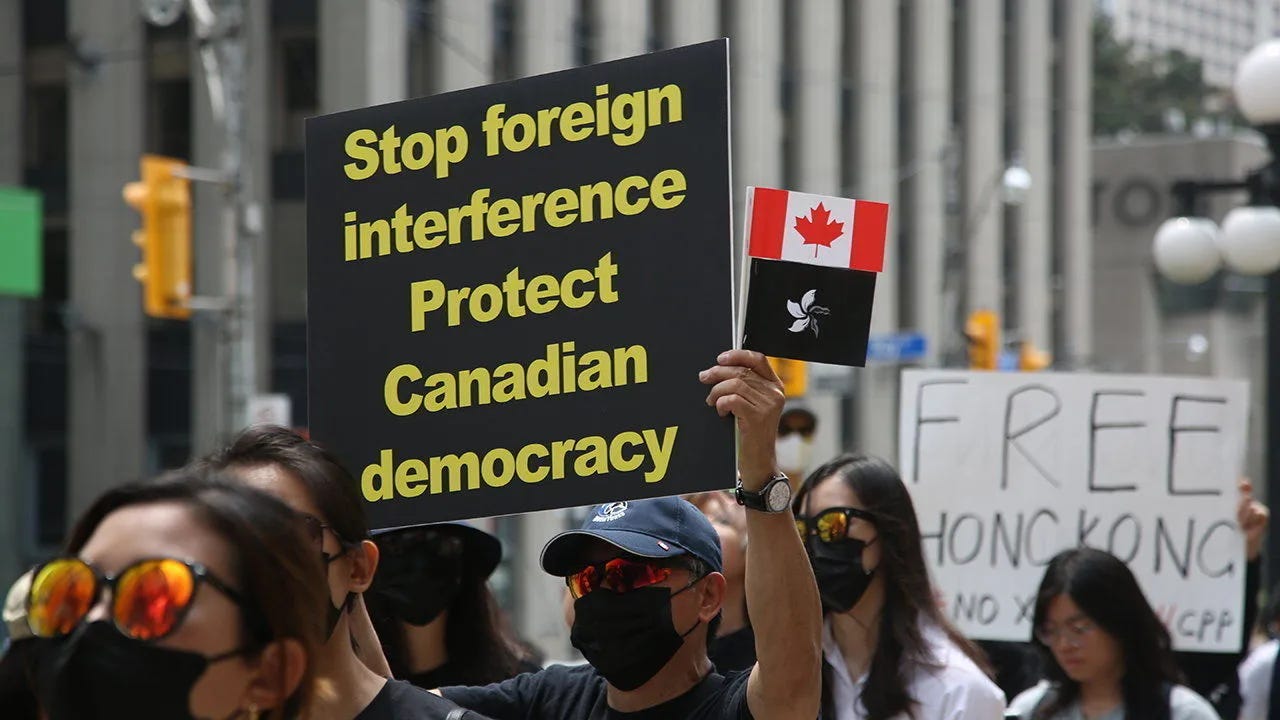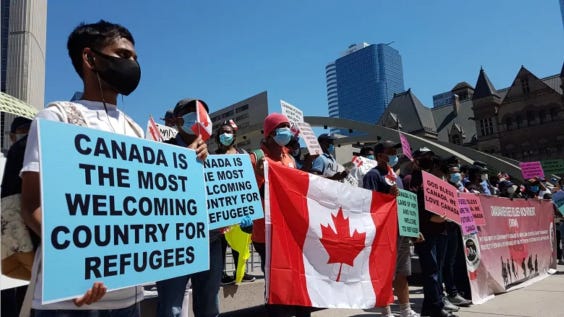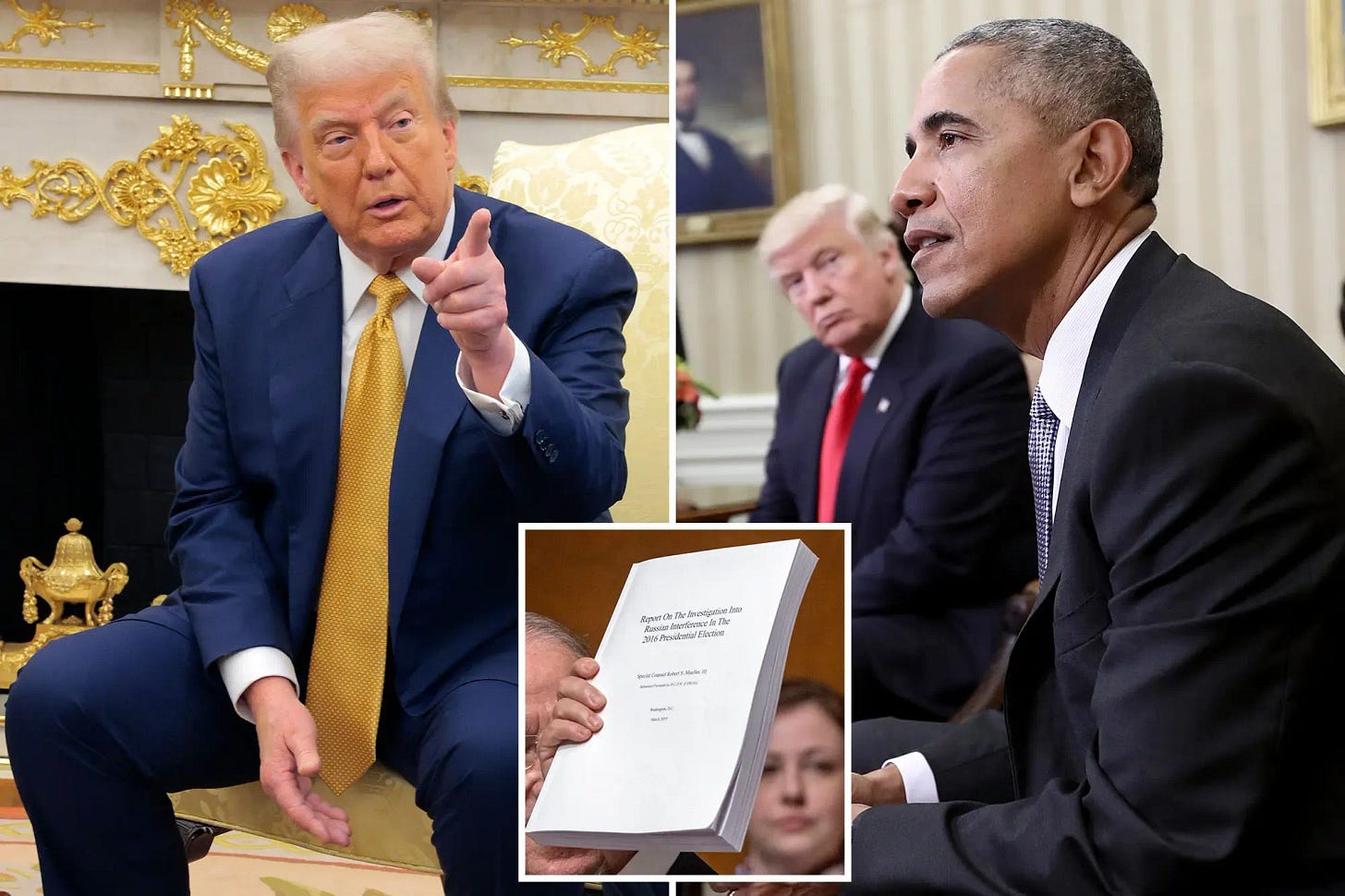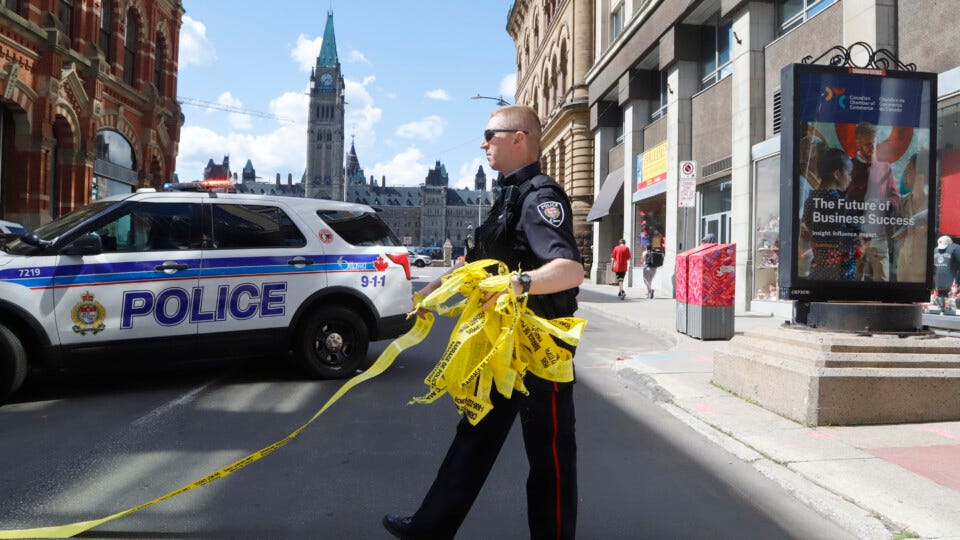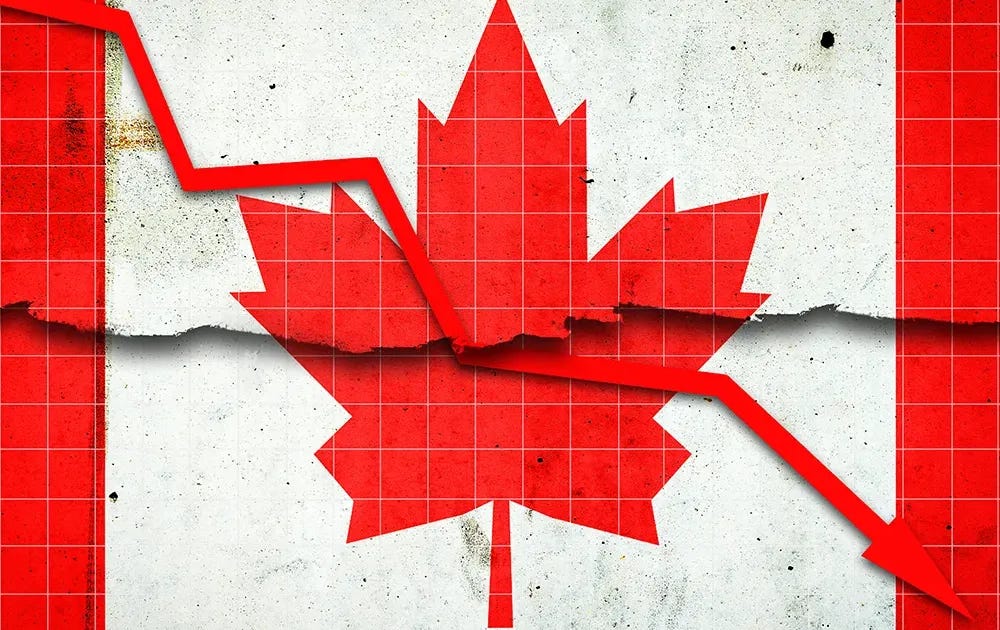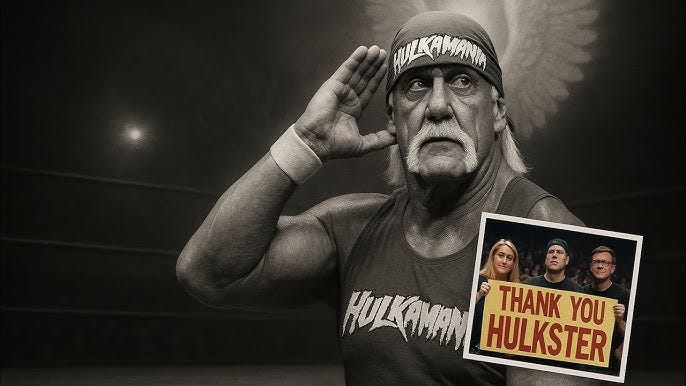Good morning, it’s Friday, July 25th. In today’s news, RBC terminates Freedom Convoy lawyer’s account, Liberals delay Foreign Agent Registry again—offering no future timeline, Ottawa has spent over $2.6 billion housing asylum seekers since 2017, US DOJ to investigate Obama over Trump ‘treason’ accusations, and much more.
First time reading the daily blend? Sign up here.
Banking on Ideology: RBC Terminates Freedom Convoy Lawyer’s Account
Eva Chipiuk, a Canadian lawyer best known for representing Freedom Convoy organizers and challenging the federal government’s invocation of the Emergencies Act, has just been dropped by her bank. Without warning, the Royal Bank of Canada (RBC) informed Chipiuk it would be terminating her accounts, citing vague “risk-related concerns.” No fraud. No criminal activity. Just “recent activity outside of RBC’s risk appetite.” Her crime? Buying bitcoin.
Chipiuk says it all started when RBC froze her account after a crypto purchase. After verifying the transaction herself, the bank eventually cleared it—but followed up with a strange line of questioning that she described as “demeaning.” A few days later, she received a letter informing her that RBC would be ending their relationship altogether, giving her until August 18 to find a new financial institution. No further explanation was provided.
The official letter from RBC claims the decision was made “in accordance with federal regulations,” but doesn’t cite a law or provide a clear reason. The only concrete “red flag” was a routine bitcoin transaction—hardly illegal, and increasingly common. But Chipiuk is no ordinary client. She’s a vocal critic of the Trudeau-era institutions that weaponized financial systems against peaceful protesters in 2022. And now, it seems, the same tactics are being used again—just with less fanfare.
Even if this wasn’t politically motivated, the optics are chilling. We now live in a country where being on the wrong side of a protest, a lawsuit, or a government narrative can quietly get your bank account shut down. No trial. No charge. Just a letter from the bank saying: “you’re no longer welcome.”
“If financial institutions can cut you off without explanation, without notice, and without due process, that is a serious problem in a free society,” Chipiuk said. And she’s right. The foundation of a democratic country is the ability to speak, associate, and act freely—without fear of financial exile for holding unpopular opinions.
Randy Hillier called it out plainly: banks are becoming unsafe for Canadians. And unless we demand safeguards and transparency, this won’t stop with high-profile figures like Eva Chipiuk. It could happen to anyone.
Canada needs to decide: will financial institutions serve all citizens equally—or only those who align with the approved orthodoxy? Source.
Liberals Delay Foreign Agent Registry Again—No Timeline, No Transparency
Despite passing Bill C-70 over a year ago—legislation that was supposedly fast-tracked in response to serious allegations of Chinese interference—the Liberal government still hasn’t delivered the foreign influence registry it promised. Public Safety Canada claims it’s “actively working on it” but can’t even offer a timeline.
Back in 2024, officials said the registry would likely be ready by June 2025. Now? There’s no office, no commissioner, no regulations published, and still no date in sight. Instead, Canadians are fed the usual bureaucratic nonsense: “It’s a complex undertaking,” “We’re learning from allies,” and “Establishing a new office takes time.” Translation: stall, delay, deflect.
Countries like the US, UK, and Australia have already implemented their own foreign agent registries, yet Canada, despite intelligence leaks confirming China’s interference in our elections, is still fumbling with red tape.
Tory MPs rightly point out that we're approaching another federal election in October 2025 with no registry in place, making Canada a “playground for foreign interference.” This registry was supposed to be in place before this vote—to prevent exactly the kind of covert interference we saw in 2019 and 2021 and, if we’re being honest, the recent election in April.
This isn’t about careful policy development. It’s about a government unwilling to implement safeguards that could disrupt the very system they benefit from. It’s foot-dragging dressed up as process, and it leaves Canada vulnerable at a critical moment in its democratic timeline.
If the Liberals were serious about protecting democracy, this registry would already exist. Instead, they’re buying time. And every day they delay, foreign interference continues unchecked.
Ottawa Has Spent Over $2.6 Billion Housing Asylum Seekers Since 2017
Since 2017, Canada’s federal government has spent a staggering $1.1 billion to house asylum seekers in hotels—a program initially framed as a temporary emergency response. Add another $1.5 billion in transfers to provinces and municipalities through the Interim Housing Assistance Program (IHAP), and the total cost soars to over $2.6 billion.
This wasn’t supposed to be a long-term solution. But as the number of asylum claims skyrocketed from 50,000 in 2017 to 173,000 in 2024, the so-called “temporary measure” of block-booking hotel rooms has become institutionalized.
Today, the federal government is still paying for hotel rooms and meals for 500 asylum seekers across five hotels—one in Quebec and four in Ontario. The current per-person cost sits at $132 a day, down from $199 a day earlier in 2024. That’s roughly $48,000 per claimant per year, assuming they remain in federally funded accommodations.
The largest recipients of IHAP funds are no surprise: Toronto has received $669.7 million, Quebec $542.7 million, and Ottawa $105.7 million. Smaller municipalities like Peel Region, which now hosts Canada’s largest asylum shelter with capacity for 680 people, have received close to $100 million. British Columbia, by comparison, received only $14.4 million.
Officials maintain this is a humanitarian necessity. A spokesperson for Immigration, Refugees and Citizenship Canada (IRCC) admitted hotels were “never a sustainable, cost-effective solution,” yet the federal government committed another $1.1 billion in its 2024 budget to keep the program going for three more years.
The goal is to transition toward more affordable accommodation options, but for now, taxpayer money continues to fuel a system that was only ever meant to be a stopgap.
Meanwhile, Canadian cities are buckling under pressure. Toronto had asylum seekers sleeping on sidewalks in 2023. Ottawa spent $54.7 million on migrant housing last year alone. And with claim volumes showing no sign of slowing, the crisis appears to be scaling—not receding.
The bottom line? A temporary emergency measure has turned into a multi-billion-dollar dependency with no clear end in sight. And taxpayers are left footing the bill for a system built on stopgaps and short-term planning.
The real question is: how long can this “temporary” measure last before it becomes a permanent liability? Source.
US DOJ to Investigate Obama Over Trump ‘Treason’ Accusations
President Donald Trump has directed the DOJ to investigate former President Barack Obama, alleging “irrefutable” evidence that the Obama administration fabricated the Trump-Russia collusion narrative to sabotage his 2016 campaign. Trump calls it treason, though no public proof has been released yet.
Obama’s camp denies the allegations, dismissing them as political theater. But the pressure ramped up after Director of National Intelligence Tulsi Gabbard declassified documents suggesting Obama-era officials knowingly advanced false intelligence to damage Trump—claims Democrats reject.
Trump and his allies argue this was a coordinated effort to delegitimize his presidency from the start. They point to a pattern of interference—including threats against Trump’s life—as part of a broader campaign to remove him from power.
While bipartisan reports confirmed Russian attempts to influence the 2016 election, they found no evidence votes were changed. For Trump’s camp, the real scandal is what they see as a weaponized intelligence apparatus used against an incoming president. More
Canada’s Crime Trends in 2024 Highlight Need for Targeted Safety Reforms
While Statistics Canada reports a 4% decline in the national Crime Severity Index in 2024, the story is more nuanced. Much of the drop came from decreases in non-violent crimes like theft and drug offences. Violent crime, on the other hand, declined by just 1%—and remains 15% higher than it was in 2020 after several years of increases.
Auto thefts were down 17% in 2024, but only after sharp rises in previous years that left insurers and police dealing with massive claim volumes. Cybercrime also fell slightly last year, yet remains more than double what it was in 2018.
Homicide rates remained relatively steady, but the number of women killed by intimate partners rose—highlighting persistent concerns around domestic violence.
In short, while some progress is being made, many Canadians still feel unsafe—and the data suggests there’s good reason for ongoing concern in several key areas. More
Passenger Jet Crashes in Russia’s Far East, Killing 48, Officials Say - The Angara Airlines plane crashed as it was preparing to land in the Amur region. More
Volodymyr Zelenskyy Retreats From Power Grab After Mass Protests - The Ukrainian president says he is taking advice from Keir Starmer on the independence of corruption watchdogs. More
Thailand Launches Airstrikes on Cambodia as Border Clash Leaves at Least 12 Dead - More
Iran Says It Will Leave the Nuclear Non-Proliferation Treaty if Sanctions Are Reimposed - More
Israel Votes 71-13 for Non-Binding Motion Calling to Annex West Bank - More
Columbia University Agrees to Pay More Than $220 Million in Deal with Trump to Restore Federal Funding - More
Canada’s Economy to Shrink for Two Straight Quarters as Private Investment Plummets
Canada’s economy is slipping into recession territory, with the CFIB forecasting two straight quarters of negative growth—Q2 and Q3 2025—driven by falling business confidence amid Trump’s escalating tariff war. Private investment is expected to plunge by 13.0% in Q2 and another 6.9% in Q3, while GDP shrinks 0.8% in both quarters. Nearly half (48%) of businesses report recent supply chain disruptions, and 64% expect things to get worse. Job vacancies remain high at 397,000, while hiring and investment are on pause. Despite the turbulence, 62% of businesses are shifting to domestic markets and adapting to weather the storm. More
Trump Admin Recommends Location Verification for Advanced AI Chips - The move is aimed at ensuring the chips do not fall into the hands of foreign adversaries. More
Tesla's Profits Fall Again as Musk Hopes Robotaxis Will Offset Declining Sales - The EV company says revenue dropped 12% between April and June. More
Meta Announces New Safety Feature for Teens and Removes 635,000 Accounts Linked to Child Predators - More
AI Just Created Concrete That Lasts Centuries and Captures Carbon
Imagine concrete that doesn’t just support buildings, but heals itself, resists wildfires, and sucks carbon dioxide out of the atmosphere. That’s now within reach thanks to a groundbreaking AI model from USC researchers. Their tool, called Allegro-FM, can simulate the behavior of over 4 billion atoms at once, unlocking the secrets to carbon-neutral, ultra-durable concrete.
With traditional cement accounting for 8% of global CO₂ emissions, this discovery will turn concrete from a climate villain to climate solution. Even better? The AI helps make it stronger and longer-lasting, potentially rivaling the durability of 2,000-year-old Roman concrete.
Backed by one of the world’s most powerful supercomputers, Allegro-FM not only accelerates discovery but also slashes computing demands using machine learning. The implications go beyond buildings: this tech could reshape how we design all kinds of materials—faster, cleaner, and smarter. More
RFK Jr. Orders Removal of Mercury From Flu Vaccines - The health secretary adopted a recommendation from an advisory panel. More
Hulk Hogan, Wrestling Legend and Pop Culture Icon, Dies at 71
Hulk Hogan, the face of professional wrestling and a global celebrity, passed away at 71 after a cardiac arrest in Florida. Rising to fame in the 1980s with "Hulkamania," Hogan transformed WWE into a cultural phenomenon and headlined the first WrestleMania. Known for his charisma, signature promos, and red-and-yellow persona, Hogan also crossed into TV, movies, and even politics, recently endorsing Donald Trump. Despite personal controversies and legal battles, Hogan remained a beloved figure. “Everywhere I show up, people treat me like I’m still the champ,” he said of the support from fans. More
Hockey Canada Trial: Judge Acquits All Five Hockey Players Accused of Sexual Assault - Judge Maria Carroccia opened Thursday's verdict by saying that she did not find E.M.'s testimony to be "credible or reliable," later noting that her story had inconsistencies. More
South Park Comes Out Swinging in Season 27 - Co-creators, Stone and Parker, started with a blistering episode taking aim at Donald Trump and its newly minted parent company, Paramount, just one day after signing a $1.5bn deal with the network. More
Ohtani Homers in 5th Straight Game to Tie Dodgers Record - More
Vancouver Airport Introduces ‘Therapy Ponies’ to Reduce Passenger Anxiety
Japan Urgently Recalls 16,000 Toy Pistols Capable of Firing Real Ammunition
On This Day in 1944, Operation Spring became one of Canada's bloodiest battles, with 1,444 Casualties and 441 Killed in a Single Day






